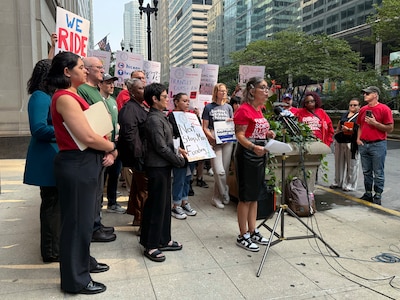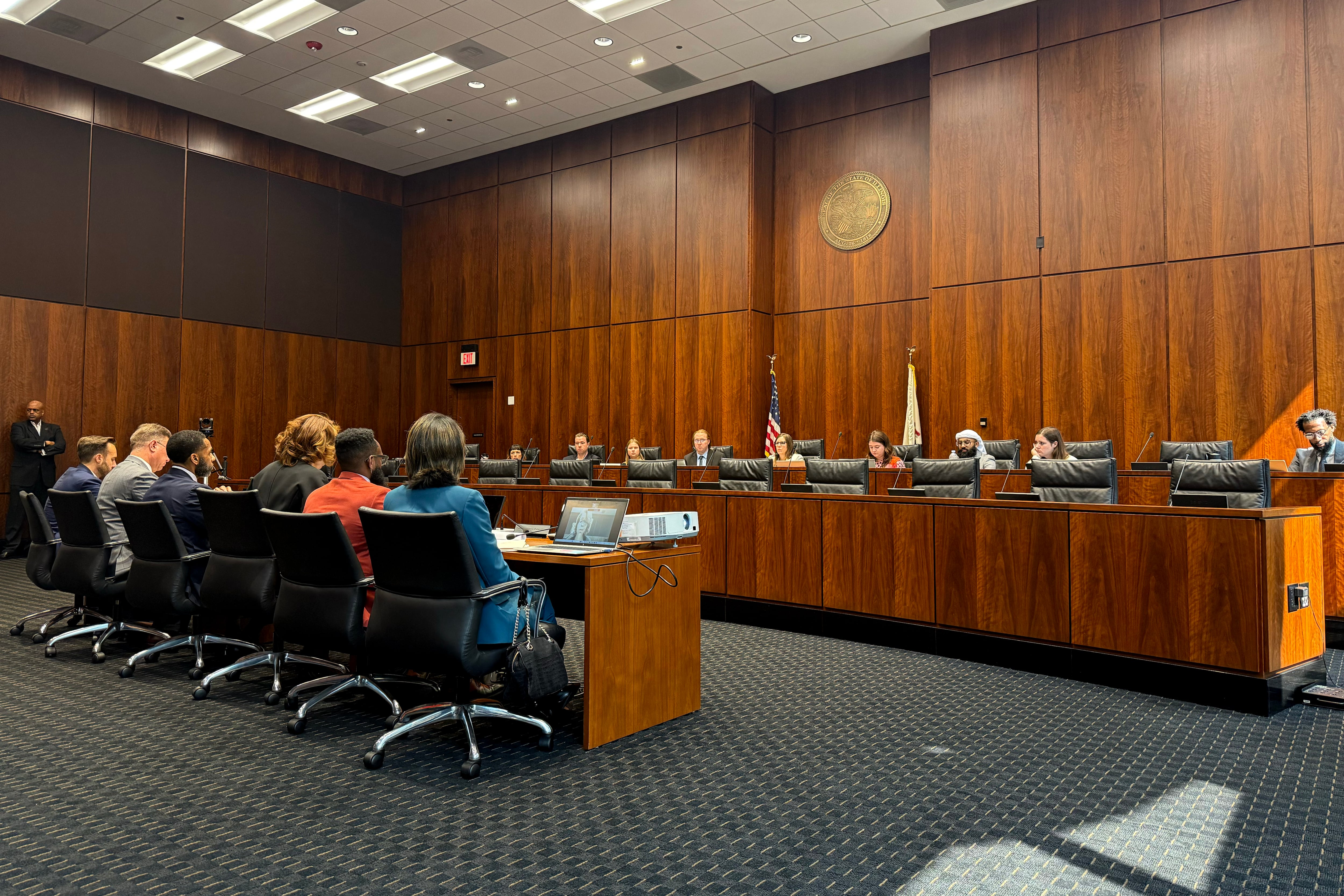Sign up for Chalkbeat Chicago’s free daily newsletter to keep up with the latest education news.
Illinois state lawmakers did not express willingness Thursday to help Chicago Public Schools close its $734 million budget gap in the coming weeks.
Although some lawmakers agree they want to boost education spending, they did not commit to doing so during a public hearing held in downtown Chicago just a few weeks before the start of the school year on Aug. 18. Chicago’s school board has until the end of August to pass a balanced budget for this fiscal year, which began on July 1. The board is expected to vote on a spending plan at its Aug. 28 meeting.
“I’m hopeful that we can move past the rhetoric, the talking points and unrealistic demands, and get down to business about how we can do better by CPS and its students,” said Illinois Democrat Rep. Ann Williams, who represents neighborhoods on the North Side of Chicago and chairs the House Executive Committee.
Illinois has increased funding for K-12 schools across the state by more than $2 billion under a funding formula created eight years ago, of which $1.1 billion has gone to CPS. The state set a goal to “adequately” fund all school districts by 2027, but they’re projected to miss that deadline. According to the state’s formula last year, Chicago schools need almost $1.2 billion to be considered adequately funded.
The hearing was called at the urging of Democrat State Rep. Curtis Tarver, who filed a bill during the spring legislative session to reinstate the Chicago School Finance Authority, which oversaw CPS’s finances from 1980 until 2010. It made financial decisions for the district and had the authority to borrow money, issue bonds, levy taxes, and approve school budgets instead of the Chicago Board of Education, according to the Civic Federation, an independent, nonpartisan research organization.
During the hearing, Tarver sharply criticized the mayor’s popularity and his legislative team. School Board member Michilla Blaise, who was appointed by Mayor Brandon Johnson, defended the mayor by highlighting his background as a teacher, to which Tarver said, “Part of the reason we are where we are is because of the ineffectiveness and sometimes ineptitude of the fifth floor,” a reference to Johnson’s City Hall office.
Chicago’s budget deficit is driven by multiple things, including rising costs and the district’s use of onetime federal COVID relief dollars to hire thousands more staff.
For weeks, the Chicago Teachers Union and some school board members have pushed the state to call a special session to address school funding issues and other impacts of federal cuts to social safety net programs.
State lawmakers and the governor have not said whether they’ll hold a special session before the regular fall veto session. Thursday’s hearing didn’t reveal an appetite to do so. After the hearing, Williams told Chalkbeat that she is interested in progressive tax ideas for raising revenue, but that calls for a special session are “gimmicky” and designed for “media attention.”
“Demanding special sessions when [the city and CPS] really weren’t there in May, when we were actually working on the budget, seems disingenuous to me,” Williams said.
The district, board members, unions, and civic groups have all floated various solutions for closing CPS’s projected $734 million budget gap. Those include borrowing money, more state funding, using more surplus dollars from a city pool of tax dollars meant to spur economic development, and forgoing a $175 million pension reimbursement to the city.
During her testimony to state lawmakers, interim CPS CEO Macquline King outlined current impacts of the shortfall, including cuts to crossing guards and hot meals.
“We cannot completely cut our way out of this situation,” King told lawmakers. “To do so would have a devastating consequence on the day-to-day operations of our schools and therefore the quality of our students’ education.”
Asked why lawmakers didn’t ask CPS officials more questions about the budget issues, Tarver said state lawmakers were “really just trying to better understand, as opposed to drill them with questions.”
Appointed Chicago school board members Blaise and Debby Pope, along with elected members Jennifer Custer and Ellen Rosenfeld, also testified about why funding cuts would negatively impact students and classrooms. But their joint testimony revealed differing opinions among the 21-person board on how CPS should solve its financial problems.
Blaise and Pope pressed state lawmakers to help CPS. Rosenfeld and Custer echoed calls for collaboration, but Rosenfeld said she’s not calling for a special session and doesn’t want the school board to take out a loan or reimburse the city $175 million for a municipal pension payment that covers some school staff. Custer said she’s not expecting the state to give CPS “a handout,” but wants lawmakers to work with the board on a solution.
Joe Ferguson, president of The Civic Federation, said a School Finance Authority might be an acceptable solution, but it wouldn’t need to operate as it did in the past. For example, it could have partial decision making power over budgets or veto power over contracts, but otherwise leave those powers in the hands of the school board, according to a report from the Civic Federation.
Tarver said he thinks the state “should have some say” over how the district spends its money. The state provides flexible education funding to all districts in Illinois and Chicago is the largest.
“I don’t know that [a School Finance Authority] needs to be in the same iteration that it was before,” Tarver said. “That was obviously 40 years ago. Things have changed.”

Half of the room was packed with members of the Chicago Teachers Union, which held a rally before the hearing along with other progressive organizations to pressure state lawmakers and Gov. J.B. Pritzker to raise revenue through new taxes, including on the state’s highest earners and corporations.
“Illinois has a Democratic super majority,” said Diane Castro, the CTU’s financial secretary, during the rally. “We are a blue state. We need that to mean something.”
Reema Amin is a reporter covering Chicago Public Schools. Contact Reema at ramin@chalkbeat.org.
Samantha Smylie is the state education reporter for Chalkbeat Chicago covering school districts across the state, legislation, special education and the state board of education. Contact Samantha at ssmylie@chalkbeat.org.





